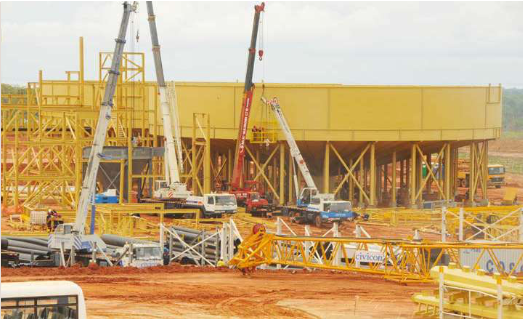

Base Titanium will let go of the first batch of employees in January next year, management has confirmed, as mining activities close on December 31.
This, even as the firm hopes to continue with exploration activities in the country under four prospecting licenses, where one has already been issued.
The Kwale-based miner has set aside at least $7 million (about Sh906.5 million at the current exchange rate) for the compensation programme that will involve 1,600 employees directly employed to the company, to be offloaded in phases.
The initial phase will affect about 350 employees with the company planning to have concluded the process by June, when physical activities will end.
Base is closing mining and mineral processing activities after the depletion of titanium ores at its licensed areas, in what will end over a decade of the company’s active participation in Kenya’s mining industry.
Base which has been mining titanium ores– rutile, Zircon, and Ilmenite in Kwale since 2013, with the first shipment of minerals made in February 2014, over the years accounted for 65 per cent of Kenya’s mineral exports.
“It has been a pleasure operating in Kenya and I can say it has been a huge success for both Base and the country. We believe we have contributed immensely to the economy and the community,” General Manager External Affairs, Simon Wall, told the Star during an interview.
The firm’s investment in Kenya begun in 2010 when it pumped an initial Sh26 billion to build the Kwale mines, with Sh9 billion spent on local content.
Capital expenditure on its projects to date is in excess of $380 million (Sh49.2 billion) -current exchange rate), with the firm having created 1,600 direct jobs, 1,430 indirect jobs (supply chain), and 1,380 induced jobs (consumer spending).
Monies that have gone into local content is at around Sh11.5 billion in purchases from Kenyan businesses, predominately SMEs.
Government revenue is valued at Sh28 billion in taxes over the mine life while Sh3.7 billion has been invested in social infrastructure, livelihood enhancement, health, and education for the local community.
Land compensation has consumed over Sh3 billion (in resettlement compensation), resulting in significantly improved socio-economic outcomes.
The firm which has worked closely with NEMA and received an approved mine closure.
Plan is currently rehabilitating the wider mine site where activities have ceased.
According to Wall, overall rehabilitation is at 90 per cent but the firm will monitor the effectiveness of the rehabilitation over a period of 12 to 18 months, even as it hands over the land to the government.
“We have an incredibly comprehensive plan that focuses on the environment, employees and community. This includes multiple specialist studies, conducted by independent experts, to provide the government with the confidence and certainty the mine site is safe,” the firm said.
This is the first such plan developed in Kenya and provides a blueprint for all future mines.
Base also has a number of initiatives to support the staff beyond employment, including counselling, entrepreneurial skills, and equipment support, a process it affirms is being driven by Kenyan laws and a collective bargaining agreement (CBA) for unionisable employees, with the final layoff expected in June next year.
However, management remains optimistic it will continue with prospecting activities for potential future investments in Kenya.
This will however be determined by finding from exploration activities where it targets to prospect in Kwale (near the current mines where it has secured a license) and areas in Tana River and Lamu counties where licensing process is still underway.
The process is however long-term, as it would take between five to 10 years, if not longer, to establish the existence of adequate resources before making heavy investment.












